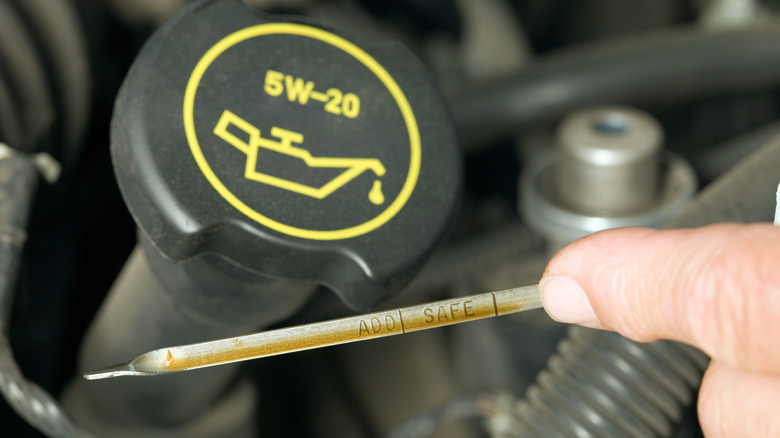How Often Do You Actually Need To Change Your Car's Oil?
Back in the day, people were told to change the oil in their cars every 3,000 miles. There were no reservations, restrictions, or excuses about it. That was likely thanks to a clever marketing tactic used by oil companies and automakers to sell more oil, but it's a rule of thumb that has stuck with generations of consumers.
But during that time, things like synthetic oil and computers that ran real-time diagnostics like oil-life monitoring systems that told you exactly when the engine needed new lubrication simply didn't exist. The only indicator informing drivers that it was time for a change was the oil light warning on the dashboard — the passage of time and how many miles somebody drove the vehicle — or manually pulling the dipstick from the engine block and checking oil levels. Many oil change places still put the little sticker in the corner of the window showing the date and mileage of your next service (so the ploy continues to some degree).
The actual answer is an ironic paradox because it can be both confusing and simplistic. On the one hand, you have several variables to consider, such as how one drives, what conditions one drives in, and the age of the vehicle. Conversely, the most straightforward answer is that no matter if your car is under warranty or not, always follow what the owner's manual says.
When all else fails, just go by the book
Most older cars use conventional petroleum-based oil, whereas most newer ones use synthetic oil, which lasts longer because it has been designed to resist breakdown at high temperatures and can suspend dirt and particulates so the filter can, in turn, catch them more readily.
Older automobiles without fancy oil monitoring systems usually operate under two different maintenance schedules — normal and severe. Things like short trips under five miles, exceptionally hot, cold, or dusty climates, a lot of stop-and-go traffic (like commuting to and from work), towing a trailer, or transporting heavy loads all qualify as severe operating conditions.
Since the average driver doesn't typically encounter these conditions, adhering to recommended oil-change intervals is safe, even after the vehicle has exceeded the warranty.
Newer cars have taken much of the guesswork out of what was once considered part and parcel of defensive driving. Today, most engines in these newer cars driven under normal conditions can last 5,000 to 7,500 miles, while high-end full-synthetic motor oil can go 10,000 miles and, in some cases, even 15,000.
As for time between changes, which does play a factor in the oil's ability to lubricate the drivetrain, the old method was every three months but now can be pushed out to six and perhaps even 12 months. Ultimately, following the owner's manual for proper maintenance schedule recommendations is always best.
Not to mention, you should never skip an oil change, whether you change your car's oil yourself or let a mechanic perform the greasy, grimy chore to avoid damage to your engine.

